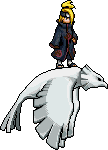Tekken (鉄拳, lit. Iron Fist) is a fighting game franchise created, developed and published by Namco (later Namco Bandai Games). Beginning with the original Tekken
in 1994, the series has received several sequels as well as updates and
spin-off titles, as well as three films and other media. The series'
official English name is always written in all-capital letters (TEKKEN, abbreviated to TK).
The story in each game in the main series documents the events of the
fictional martial arts tournament, the King of Iron Fist Tournament,
hosted by the Mishima Zaibatsu corporation. The prize is typically
control of the company, which then allows the winner to host the
following tournament.
Tekken's main rivals have been fellow 3D-fighter series Dead or Alive and Virtua Fighter.
Games
The first game in the series, Tekken, was released in 1994, first in arcades and then as a port for the PlayStation. Two sequels, Tekken 2 and Tekken 3, were released in the same fashion in 1996 and 1998. Tekken 3 was also ported to the Game Boy Advance as Tekken Advance in 2001.
The next two sequels, Tekken 4 and Tekken 5, were also ported to the PlayStation 2 in 2002 and 2004, respectively, following their release in arcades. A PlayStation Portable and PlayStation 3 version of Tekken 5, retitled Tekken 5: Dark Resurrection, was released in 2006.An online version of Tekken 5: Dark Resurrection was also released in 2007 for the PlayStation Network.
Tekken 6 was originally released for arcades in 2007, followed by an updated version, Tekken 6: Bloodline Rebellion, in 2008. In 2009, the update was released for the PS3, PSP and Xbox 360 as Tekken 6. Tekken 6-based Tekken 3D: Prime Edition was released for the Nintendo 3DS in 2012.
Gameplay
As with many fighting games, players choose a character from a lineup and engage in hand-to-hand combat with an opponent. Traditional fighting games are usually played with buttons which correspond to the strength of the attack, such as strong punch or weak kick. Tekken, however, dedicates a button to each limb of the fighter. The series uses separate buttons for right and left arms and legs, resulting in four buttons. Tekken uses no block button; starting with Tekken 2, characters automatically block while not moving forward or performing actions, a feature called "neutral guard." Standing or retreating characters will block high and middle attacks with no input from the player, while crouching characters will duck high attacks and block low ones. The gameplay system also includes throws, escapes, and ground fighting. Some characters are equipped with parries and reversals which act like traditional "press button to block" systems.Tekken 3 introduced several gameplay possibilities that were retained in later games, including the ability to sidestep into the foreground or background. Tekken 3 and later games also reduced recovery time after being knocked down and gave characters rolls to recover instantly after hitting the ground, allowing the player to get back into the fight more quickly at the risk of being hit while rolling. Tekken 4 gave characters even greater mobility by adding true 3D movement inside geometrically complex arenas with uneven ground, obstacles, and walls. The 3D gameplay allows damaging side and back throws as a reward for outmaneuvering the opponent, as well as evasive attacks that develop directly from a sidestep.
Tekken 5 saw a combination of walled and infinite arenas, while discarding uneven ground. Tekken 6 retains much of the design from Tekken 5 but also includes "Rage" mode (when a character is near the end of his vitality bar, he earns a damage multiplier) and "Bound" hits (which when they connected with an airborne opponent, will place him in an unescapable grounded state, allowing combo extensions). Tekken 6 also has destructible floors that allow the fighters to fall through to new fighting areas when broken.
Characters
Players can choose from a diverse cast that hails from a variety of ethnic backgrounds and fighting styles. A few characters have supernatural origin, such as Devil, Mokujin and Ogre, while animal characters like Kuma the bear provide comic relief. In the story mode of the game, each character generally has their own personal reasons for entering the tournament and competing for the prize.So far, only six characters have appeared in all eight Tekken installments: Heihachi Mishima, Paul Phoenix, Nina Williams, Yoshimitsu, King and Kuma (the latter two albeit technically being two different characters with the same name). The Jack cyborgs, Anna Williams, Kazuya Mishima, Lee Chaolan and Lei Wulong also come close, having appeared in seven installments.
Characters with background connections in the story typically have styles or moves in common. For example, the three playable generations of the "orthodox" Mishima family (Heihachi, Kazuya, and Jin) have handed down many family techniques, such as their signature "crouch-dash" and the moves that chain from it. Jin is more divergent, because his mother was also a playable character, and he inherited some of her moves along with Kazuya's. There are other story relationships that affect gameplay, such as Wang Jinrei and his granddaughter/student Ling Xiaoyu, or Baek Doo San and his student Hwoarang. Some, like Anna Williams, started as an "alternate costume" for an existing character before branching out and getting some unique moves in later installments.
Some of Tekken characters have been featured as guest characters in other video games, such as Digimon World Re:Digitize, Naruto Shippuden: Ultimate Ninja Storm 2, Pac-Man Fever, Smash Court Tennis Pro Tournament 2, Soulcalibur II, PlayStation All-Stars Battle Royale, Ridge Racer 6 and Urban Reign, as well as in some crossover role-playing video games, including Cross Edge, Namco × Capcom and the upcoming Project X Zone.














0 komentar:
Posting Komentar